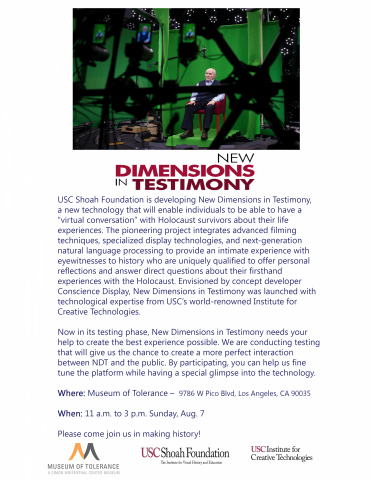
Help USC Shoah Foundation test a new set of interviews for New Dimensions in Testimony at the Museum of Tolerance in Los Angeles.

Help USC Shoah Foundation test a new set of interviews for New Dimensions in Testimony at the Museum of Tolerance in Los Angeles.

Summer might be a break for students, but as an educator, I know teachers are busy enhancing their skills and knowledge to improve their curriculum and students’ overall experience in their classrooms. As you contemplate lesson plans for the upcoming year, will you be planning a unit or lesson about the Holocaust? Do you feel you have enough knowledge about the topic to teach it well? How will you introduce your students to that history and experiences? What readings and resources will you use? What approach will you take with this sensitive topic?
USC Shoah Foundation, writer Robin Migdol sits down with Kia Hays project manager of New Dimensions in Testimony.
Highlights of the 2016 Master Teacher program in Budapest. A USC Shoah Foundation’s professional development initiative, Master Teacher (formerly Teaching with Testimony) is a two-year program that incorporates workshops, mentoring, and community building to prepare educators to search for and utilize testimony from the Visual History Archive, as well as other digital learning tools such as IWitness.
Carlos Mendes was the son of Aristides Sousa Mendes, Portuguese diplomat stationed in Bordeaux in the late 1930s who issued tens of thousands of visas to Jewish families, in direct violation of anti-Jewish laws instituted by Portugal’s fascist government at the time. Carlos Mendes reflects on his father’s fundamental willingness to risk his career and life to save persecuted Jews.
Carlos Mendes explains the sadness he feels for his father’s overlooked heroism and the pride he feels for the work his father did.
Aristides de Sousa Mendes was a Portuguese diplomat stationed in Bordeaux in the late 1930s who issued tens of thousands of visas to Jewish families, in direct violation of anti-Jewish laws instituted by Portugal’s fascist government at the time. For this act of resistance, Sousa Mendes faced trials and conviction, leaving him to live out the rest of his life in poverty and disgrace, and his 15 children scattered all over Europe and the U.S.
Esther Dresner expresses the gratitude she feels to Aristides de Sousa Mendes, a man who did the right thing, regardless of the price.
Aristides de Sousa Mendes was a Portuguese diplomat stationed in Bordeaux in the late 1930s who issued tens of thousands of visas to Jewish families, in direct violation of anti-Jewish laws instituted by Portugal’s fascist government at the time. For this act of resistance, Sousa Mendes faced trials and conviction, leaving him to live out the rest of his life in poverty and disgrace, and his 15 children scattered all over Europe and the US.
Jewish survivor Henri Deutsch explains the extent of Aristides de Sousa Mendes’ deep commitment to aiding persecuted Jews.
Aristides de Sousa Mendes was a Portuguese diplomat stationed in Bordeaux in the late 1930s who issued tens of thousands of visas to Jewish families, in direct violation of anti-Jewish laws instituted by Portugal’s fascist government at the time.
Henri Deutsch reflects on the sacrifice that Portuguese diplomat Aristides de Sousa Mendes made to save the lives of so many Jews during the Holocaust.
Aristides de Sousa Mendes was a Portuguese diplomat stationed in Bordeaux in the late 1930s who issued tens of thousands of visas to Jewish families, in direct violation of anti-Jewish laws instituted by Portugal’s fascist government at the time.
Earlier this summer, Eleanor Beardsley of NPR met with a group of Holocaust survivors and relatives gathered in Bordeaux, France. They were beginning a 10-day trek, tracing a specific escape route from France to Portugal by way of Spain. These survivors were brought together by the memory of one man: Aristides de Sousa Mendes.